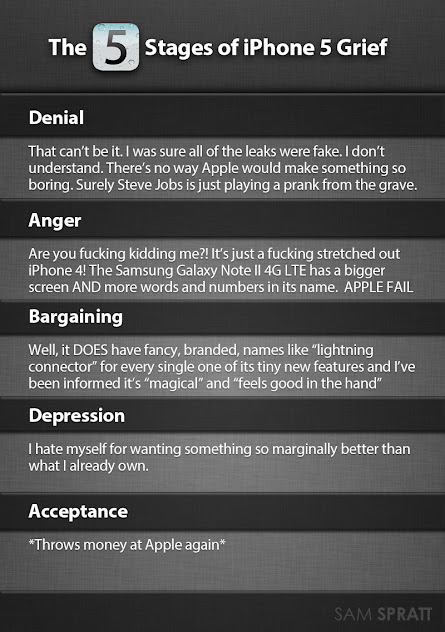In Slate, Farhad Manjoo calls for the abolition of the worst carbuncle on Apple’s escutcheon:
iTunes 11 did not arrive on time. Apple originally promised to deliver the next version of its ubiquitous music-management program in October. Last month, though, the company announced that the release would slip to November, because the company needed “a little extra time to get it right.” This week the Wall Street Journal, citing “people who have seen it,” reported that the real cause was “engineering issues that required parts to be rebuilt.”
I suspect both those explanations are euphemisms for what’s really happening in Cupertino. I picture frazzled engineers growing increasingly alarmed as they discover that the iTunes codebase has been overrun by some kind of self-replicating virus that keeps adding random features and redesigns. The coders can’t figure out what’s going on — why iTunes, alone among Apple products, keeps growing more ungainly. At the head of the team is a grizzled old engineer who’s been at Apple forever. He’s surly and crude, always making vulgar jokes about iPads. But the company can’t afford to get rid of him — he’s the only one who understands how to operate the furnaces in the iTunes boiler room.
Then one morning the crew hears a strange clanging from iTunes’ starboard side. Scouts report that an ancient piston — something added for compatibility with the U2 iPod and then refashioned dozens of times — has been damaged while craftsmen removed the last remnants of a feature named Ping whose purpose has been lost to history. The old engineer dons his grease-covered overalls and heads down to check it out. Many anxious minutes pass. Then the crew is shaken by a huge blast. A minute later, they hear a lone, muffled wail. They send a medic, but it’s too late. The engineer has been battered by shrapnel from the iOS app management system, which is always on the fritz. His last words haunt the team forever: She can’t take much more of this. Too. Many. Features.
I use iTunes, but only because I need to back up my iPhone data … and nearly half the time, iTunes craps out on me and I have to go looking for fixes or work-arounds from Apple. Since I updated my iPhone to the most recent iOS version, I haven’t been able to sync with iTunes at all. Here’s hoping that the new version will fix that — and maybe, if we’re lucky, some other issues, too.
Update, 1 December: The update went well enough, but it still couldn’t contact the iTunes store or detect my iPhone. After a few minutes of looking through the Apple troubleshooting help pages, I reset the DNS cache and re-enabled iTunes to run in Administrator mode. That was enough to let it detect the iPhone and run a backup and re-synch.





